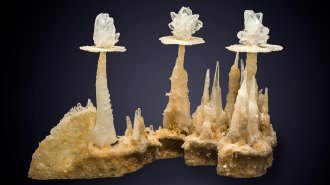Uncategorized
-
 Quantum Physics
Quantum PhysicsAliens could send quantum messages to Earth, calculations suggest
Scientists are developing quantum communications networks on Earth. Aliens, if they exist, could be going further.
-
 Health & Medicine
Health & MedicineHow scientists are shifting their search for links between diet and dementia
Studies of food’s impact on Alzheimer’s disease and dementia are hampered by complexity. Scientists hope new research approaches prove more fruitful.
-
 Paleontology
PaleontologyFeathers may have helped dinosaurs survive the Triassic mass extinction
New data show that dinosaurs were able to weather freezing conditions about 202 million years ago, probably thanks to warm feathery coats.
-
 Planetary Science
Planetary ScienceA new look at the ‘mineral kingdom’ may transform how we search for life
A new census of Earth’s crystal past hints that life may have begun earlier than expected, and could be a tool to look for water and life elsewhere.
By Asa Stahl -
 Earth
Earth50 years ago, a new theory of Earth’s core began solidifying
In 1972, scientists proposed that Earth’s core formed as the planet came together. Fifty years later, that theory is generally accepted, though many mysteries about the core remain.
By Nikk Ogasa -
 Health & Medicine
Health & MedicineThis soft, electronic ‘nerve cooler’ could be a new way to relieve pain
A tiny electronic device implanted in the body generates targeted pain relief by cooling off nerves, experiments in rats suggest.
By Meghan Rosen -
 Space
SpaceSix months in space leads to a decade’s worth of long-term bone loss
Even after a year of recovery in Earth’s gravity, astronauts who’d been in space six months or more still had bone loss equal to a decade of aging.
By Liz Kruesi -
 Health & Medicine
Health & MedicineNew COVID-19 boosters could contain bits of the omicron variant
The omicron variant is different enough from the original version to require an update to COVID-19 vaccines, experts say.
-
 Paleontology
PaleontologyMegatooth sharks may have been higher on the food chain than any ocean animal ever
Some megalodons and their ancestors were the ultimate apex predators, outeating all known marine animals, researchers report.
By Asa Stahl -
 Particle Physics
Particle PhysicsHow physicists are probing the Higgs boson 10 years after its discovery
The famous particle may point to cracks in the standard model and new physics beyond.
-

‘Elusive’ profiles the physicist who predicted the Higgs boson
Peter Higgs, as Frank Close reveals in his new book, was just one of many physicists who helped crack the mystery of mass’s origins.
-
 Tech
TechA neck patch for athletes could help detect concussions early
The small sensor is sleeker and cheaper than other devices used to monitor neck strain in athletes.
By Nikk Ogasa